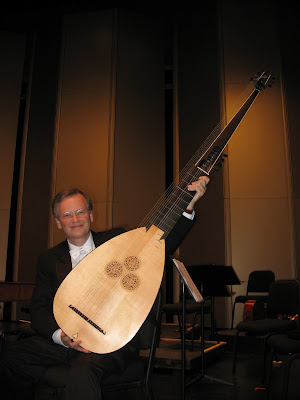11/08/2010
CORELLI: Concerto grosso Op. 6, No. 11 in B-flat major
PERGOLESI: Sinfonia in F major
VIVALDI: Le quattro stagioni (The Four Seasons)
ZAVATERI: Concerto decimo a Pastorale, Op. 1
DURANTE: Concerto No. 5 in A major
Elizabeth Blumenstock, violin solo
Nicholas McGegan, conductor
這場音樂會是去Cancun之前幾天去聽的。和幾週前Archetti那場音樂一樣,曲目不但都聽過,而且手上都有這些曲子的錄音。Corelli的大協奏曲,Durante和Zavateri的協奏曲,以及有聽古典樂不可能沒聽過的「四季」協奏曲,也都在我的部落格都有介紹過。因此,這次來,並不是帶著認識新的音樂的心情,而是抱著聽Philharmonia Baroque能帶來怎樣的詮釋而來。
在一個全是義大利巴洛克作曲家的曲目當中,只有韋瓦第是沒有和波隆拿(Bologna)扯上關係的。其中,Durante和Pergolesi還是師徒的關係。這些曲子都是給絃樂合奏的協奏曲,不像韋瓦第的小提琴獨奏協奏曲。不過在Corelli的大協奏曲式底下,仍有獨奏樂器群的表現。Durante, Zavateri,以及Pergolesi,都是晚期義大利絃樂合奏曲的代表,「宗教(da chiesa)」和「世俗(da camera)」之界定已模糊。
Philharmonia Baroque在McGegan的帶領下,選擇不做太極端的詮釋方式,Corelli,Pergolesi,和Zavateri,都採較平順中庸的拉法。Zavateri,因為習慣自己手邊Freiburg Baroque Orchestra比較剛猛的拉法,所以PBO的這首Zavateri,相對地懶散了些。尤其是這首協奏曲四個段落有三個是慢樂章,因此唯一的快樂章原本希望是有個強而有力的對比。反而,PBO的表現,有點像是中年貴婦喝完下午茶,撐著肚子走向迎接她們的馬車。不過,這首Zavateri的終樂章是pastorale,和屬於聖誕協奏曲的一種,PBO充份傳達了安詳寧靜的氣氛,做為未來聖誕假期拉起序幕。
Durante的表現,算是最讓我刮目相看。在表演這首曲子之前,McGegan特別轉過頭來說:「這首應該是最接近卓別林的曲子了。」沒錯,Durante的第五號,氣氛超歡樂,第一樂章直接以Presto開頭,而PBO的表現也不輸歐洲一流的樂團,如整體性有不足,但活力絕對是夠的。
這場音樂的重頭戲,當是韋瓦第的四季。獨奏小提琴家Elizabeth Blumenstock,是PBO固定的班底,而且有時候也會當客座指揮。在音樂開始前,PBO的公關出來和大家講說Blumenstock小姐手臂受了傷,所以要嘛帶傷上陣,演出水準可能會受到一點影響,要不然就是受傷太嚴重,曲目得取消。
所幸,Blumenstock最後還是決定演出。Blumenstock是灣區最資深的巴洛克小提琴家之一,特別現場的表演中,詮釋作風刺激大膽的小提琴家。因為她的表演風格,下弓下得相當重,有時太猛的時候,琴音會有點沙沙的感覺,比較習慣傳統拉法的人或許會不習慣。不過,有時這種不同音色有一種粗獷感,更可以襯托出小提琴耍炫技的橋段。Blumenstock是Musica Pacifica還有Arcadian Academy的成員,其Marais和Uccellini的一些錄音都獲得好評。
韋瓦第的四季,雖然熟到不能再熟了,不過說也奇怪,我並沒有聽過現場的表演。PBO和Blumenstock的表演,卻是讓我印象深刻。因為Blumenstock非常有性格的拉法,樂句表現有彈性,會適時地呼吸,將「四季」拉得很有生命。跟一般之前另外,如不在現場聽,那麼大眾的曲子,說不定還不一定會意識到這些協奏曲的小提琴獨奏部份是有相當程度的挑戰的。如音樂會相關單位說的屬實,那Elizabeth Blumenstock小姐的傷,的確有影響她拉某些音的音準。而且,她那麼激動的拉法,音又多又快的時候,拉不好的頻率也會跟著上升。不過,如果不去計較這個問題,那Blumenstock的表現出的音樂性是極佳的。有別於許多現代樂器版和拉法,音過於濃厚,圓潤,古樂的拉法是有活力,有方向的。
四個季節裡,PBO表現最新奇的一首,是冬天。第一樂章,除了獨奏小提琴開始的每個八分音符的顫音以外,樂團裡其他的聲部也都一起加入了強而有力的顫音。這種極度不和諧的效果,為的是更生動地刻畫出寒風刺骨的感覺。在坐的許多聽眾,聽到他們演奏「冬」的前幾小節,大聲的「哇」自然脫口而出。
總言之,整體PBO樂團表現還踏實,而Blumenstock搏命的演出中,讓我可以姑且不提她的小缺失,而真正欣賞到她對於「四季」的詮釋,是此次音樂會最大的收穫。而且中場的時候,還有和彈theorbo的David Taylor聊聊天。之前的音樂會就有找過他簽我的CD了,所以這次只是特別照他拿著他琴的特寫。
This is a concert I attended a few days before leaving for my trip to Cancun. An all-Italian concert, I also happen to have heard all the pieces and own recordings of them. Therefore, I was going into these concerts not exploring any new music, but really focus on the known music, and PBO's interpretation of the music.
Interestingly enough, with the exception of Vivaldi, the remaining composers were based in Bologna at some point, which included Corelli's early career as well. Zavateri and Durante, lesser-known composers that I have reviewed in my blog before, as well as Pergolesi, are representatives of the late Bolognese school, whose string concertos are upbeat and melodic whose distinctions between "da chiesa" and "da camera" are blurred. PBO's playing was smooth and solid, and Nicholas McGegan avoids taking any extremes on the Corelli, Pergolesi, and Zavateri piece. However, the Zavateri concerto, being a Christmas concerto and ending in the pastorale, should have had a bit more contrast in their only fast movement there. In comparison to Freiburg Baroque's feistiness and immediacy, PBO's playing was too leisurely, like a bunch of socialites strolling through a park after their teatime.
The Durante, on the other hand, was very well done. Before playing the piece, McGegan turned around and addressed the audience that this piece was "as close to Charlie Chaplin" that one could get. And yes, it was done with much liveliness and panache that could match the best in the business.
The true focus of the concert however, was Vivaldi's Four Seasons. No matter how well I know the pieces, it may sound surprising that I have never really heard these concertos played live. The soloist Elizabeth Blumenstock is a very well-established American Baroque violinist of the Bay Area. She is a member of many ensembles, including Musica Pacifica and the Arcadian Academy, which made several outstanding recordings of Marais and Uccellini. I have always found her live performances to be very enjoyable, never bland, full of energy, willing to give the music an extra oomph, at the expense of some excessive bowing and a scratchy tone at times.
It was announced that Blumenstock suffered from an arm injury, and her performance could be "unpredictable." Sure, she would miss a few notes here and there at quicker and more difficult passages, but the musical idea she conveyed was always convincing. Seeing and hearing the pieces played live, you really appreciate at the significant challenges that the concertos can present to the soloist. Since we are used to hearing the concertos played in the background, we might take it for granted too much and pass it off as a student etude. Nothing can be further from the truth.
The real surprise came in the "Winter," where PBO and Blumenstock team up with very strong trills in the opening bars of the concerto. The great dissonance vividly portrays harsh chilly winter winds, so great was the effect that many audience members could be heard saying "wow.." Since it's safe to say that the people coming to these concerts must be regulars, I guess that really made a big impression on them.
Asking for a Biondi-like performance of the Four Seasons can be asking too much, but I would be more than happy to hear Blumenstock play any time.

I heard Blumenstock with Musica Pacifica years ago in Cleveland, OH. I remember enjoying the concert, despite having a broken leg at the time.
ReplyDeleteI recently heard the Quattro Stagioni here in Richmond with Venice Baroque. They were excellent, with Robert McDuffie as soloist. He had charm, but his vibrato was too much to handle.